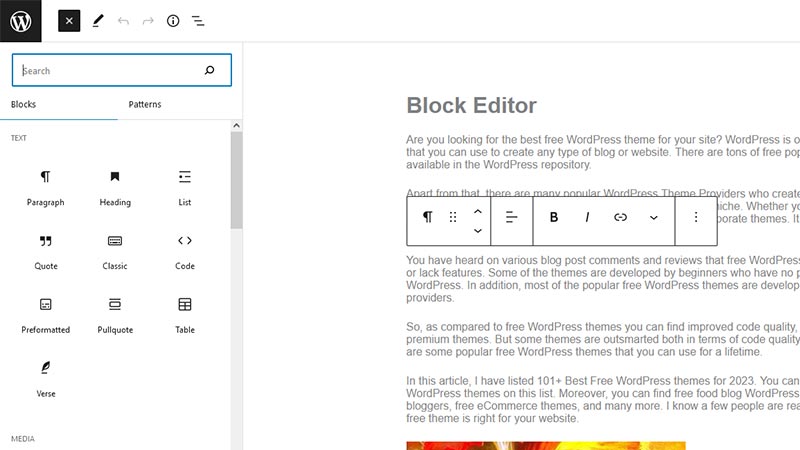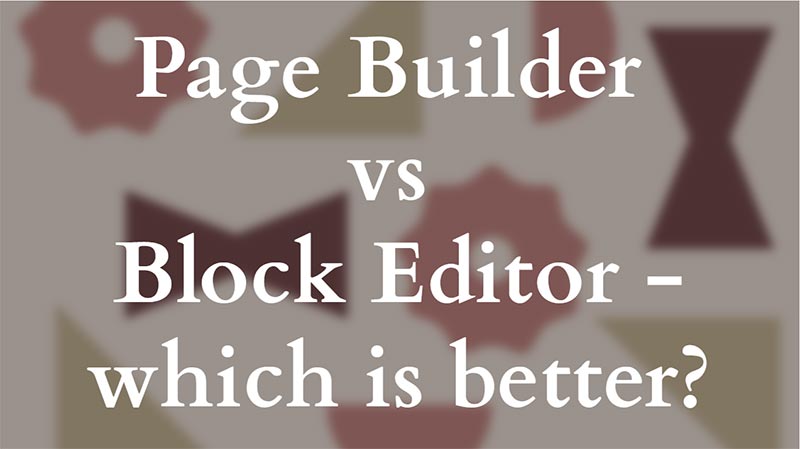Do you know the difference between Page Builder vs Block Editor? Are you anxious to know which is better?
WordPress is one of the most popular content management systems (CMS) in the world, with over 40% of websites built using it. One of the reasons for its popularity is the flexibility it offers in terms of customization. Two of the most popular ways to customize the appearance of WordPress sites are through the use of page builders and block editors.
Page builders are standalone plugins or software that allow users to create complex page layouts by dragging and dropping pre-designed elements. These elements include columns, sections, and widgets. Page builders often come with a variety of pre-designed templates. Furthermore, any user can customize these templates by adding their own content and adjusting the layout.
On the other hand, block editors come with built-in editors within content management systems (CMS) such as WordPress. Block editors are designed to create and edit content using a block-based approach. Each block represents a specific type of content or media such as text, images, videos, or embeds. Users can customize each block’s settings and attributes such as font size, color, and alignment.
One of the main advantages of page builders is that they allow users to create complex page layouts without any coding skills. But, block editors are generally more focused on content creation and may need some basic knowledge of HTML and CSS. Yet, block editors are often more lightweight and faster to use than page builders.
In this article, we will explore the differences between page builders and block editors in WordPress and the pros and cons of each.
What is a Page Builder?

A page builder is a WordPress plugin that allows users to create custom web pages using a drag-and-drop interface. Page builders come with pre-built elements and templates that can be used to create pages without the need for coding skills.
There are several popular page builders available for WordPress, including Elementor, Beaver Builder, Divi Builder, and Visual Composer. These page builders have a large user base and offer a wide range of features and functionalities to users.
Pros of Using a Page Builder
User-Friendly Interface: Page builders get designed with a user-friendly interface that allows users to create custom web pages. You don’t need any coding skills to use the page builder plugin. The drag-and-drop interface makes it easy to add and edit elements on the page. Additionally, the pre-built templates and elements make it easy to create an attractive page in minutes.
Customizable Templates: Page builders come with a wide range of customizable templates that can be used to create a custom web page. These templates can be edited to match the branding and design of a website, making it easy to create a consistent look and feel across all pages.
Pre-built Elements: Page builders come with pre-built elements such as buttons, forms, and sliders, which can be easily added to the page. These elements are designed to be mobile-responsive, so they will look great on all devices.
Time-Saving: Page builders can save time by eliminating the need for coding skills. They allow users to create a custom web page quickly and easily, without the need for technical knowledge.
Integration with Other Plugins: Page builders integrate seamlessly with other WordPress plugins, making it easy to add functionality to a custom web page. For example, users can easily add a contact form or social media icons to a page using a page builder.
Cons of Using a Page Builder
Cost: Page builders can be expensive. Additionally, for those users who need advanced features and functionalities. Some page builders are subscription-based, which means that users need to pay a monthly or yearly fee to access the software.
Bloated Code: Page builders can create bloated code, which can slow down the website. This is because page builders often load a lot of extra CSS and JavaScript files to display the pre-built elements and templates.
Compatibility Issues: Page builders can sometimes have compatibility issues with other WordPress plugins or themes. This can cause issues such as broken functionality or design issues.
Learning Curve: Although page builders come with user-friendly designs, they can still have a steep learning curve for users who are new to WordPress or web design.
What is WordPress Block Editor?

The WordPress Block Editor is a visual editor introduced in WordPress 5.0 that uses blocks to create content. Each block represents a specific type of content, such as paragraphs, headings, images, videos, and more. The block editor provides a more intuitive and flexible way to create and edit content than the classic editor.
Pros of using Block Editor:
User-friendly interface: The block editor provides a more user-friendly interface, which allows users to create and edit content without any coding knowledge.
Versatility: With the block editor, users can easily create a wide range of content, including multimedia content such as videos, images, and audio.
Flexibility: The block editor offers greater flexibility when it comes to layout and design. Users can easily move and arrange blocks to create the desired layout.
Consistency: The block editor offers a more consistent and standardized approach to creating content, which can be especially helpful for teams or organizations with multiple contributors.
Cons for using Block Editor:
Learning curve: The block editor may take some time to get used to, especially for users who have experience using a classic editor.
Compatibility: The block editor may not be fully compatible with all WordPress plugins and themes. In addition to that it can cause issues when it comes to creating and editing content.
Performance: The block editor can be resource-intensive, which can affect the performance of your website if you have a lot of content.
Customization: The block editor may not be as customizable as the classic editor, which can limit some users in terms of design and layout options.
Overall, the WordPress Block Editor provides a more modern and intuitive approach to creating content. But it may not be the best fit for every website or user. It’s important to check your specific needs and preferences before deciding whether to use the block editor or stick with the classic editor.
Conclusion
Ultimately, the choice between a page builder and a block editor comes down to your specific needs and goals. If you need a high level of customization and flexibility, a page builder may be the better choice.
But if you’re looking for a simpler and more streamlined approach to content creation, a block editor may be the way to go. There are also Elementor addons that you can use if you want to extend the design functionality of your site.
Now over to you,
Are you using a Page Builder or Block Editor?
Which website builder do you choose to create your WordPress site?
Please let us know your thoughts and follow us on Facebook and Twitter.
